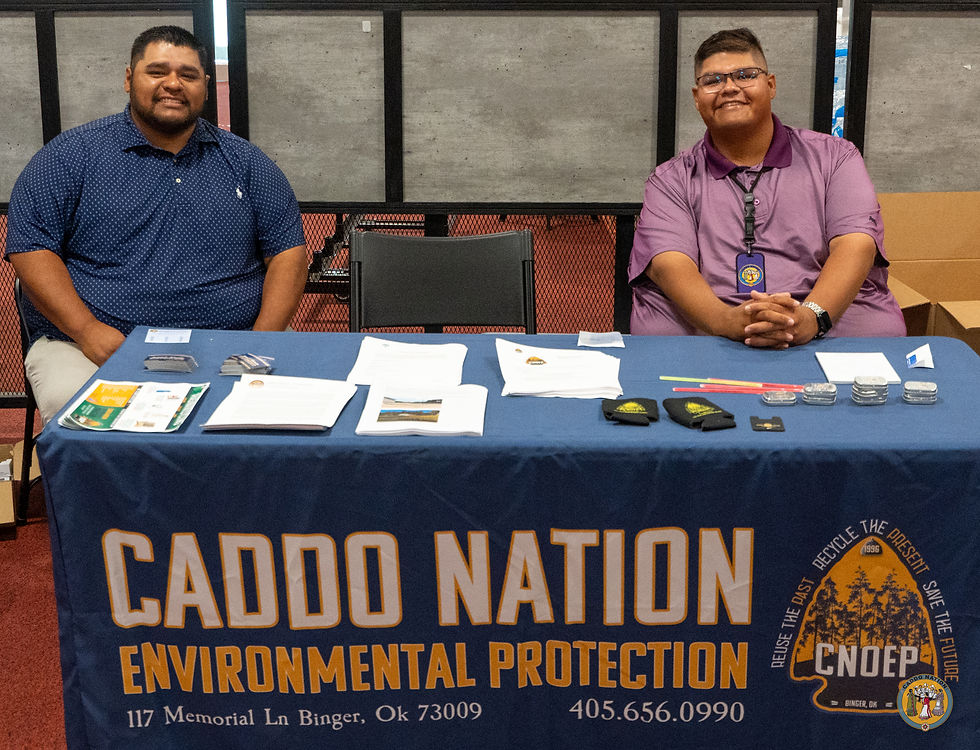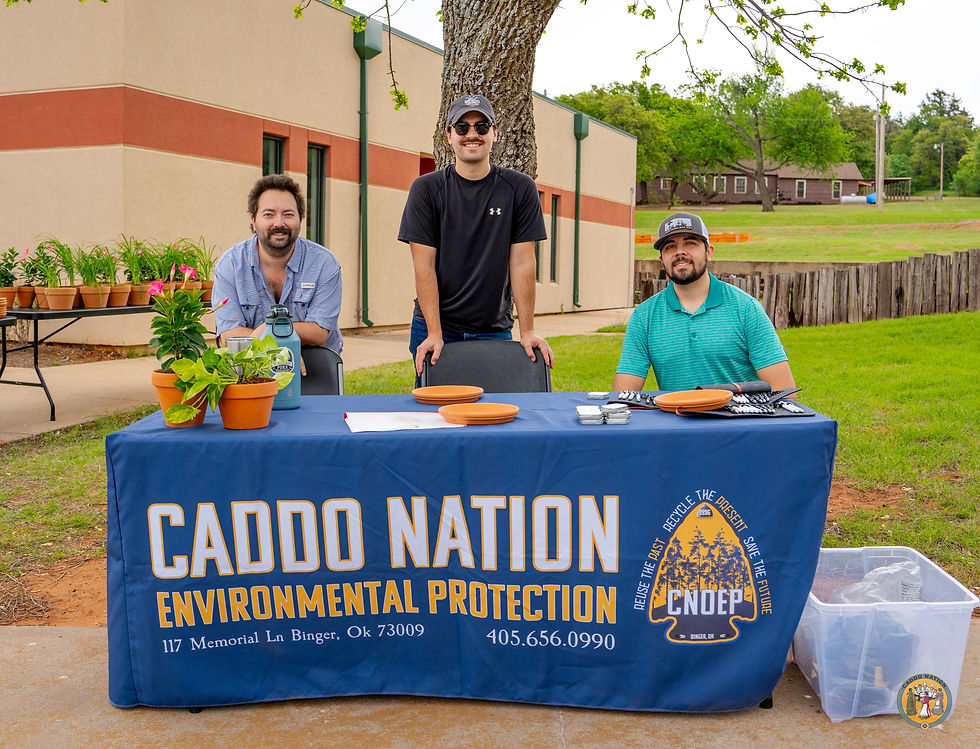
A Team Dedicated to Environmental Stewardship
At the heart of the Caddo Nation's environmental initiatives is a dedicated team of five individuals, each bringing unique skills and passion to their roles. Josh Worcester leads the department as Director, working alongside Brandon Worcester, Environmental Specialist; Cameron Roberts, Natural Resources Specialist; Kolby Williams, Conservation Field Technician; and Cody Roberts, EPA Office Assistant. Together, this dynamic group is spearheading efforts to protect and nurture the Caddo Nation's natural resources.

From Humble Roots to Expansive Vision
In a modest office at the Caddo Nation tribal complex, a group of forward-thinking men are cultivating a vision that extends far beyond their current roles. Josh Worcester, Director of the Caddo Nation Environmental Protection office, and his colleague Cody Roberts are part of a team that's rapidly expanding its scope and impact.
From its humble beginnings just three years ago with a single grant funding two positions, the department has blossomed into a five-person team managing eight grants and bringing in over $800,000 annually. But for Worcester and his team, this is just the beginning.
"We're trying to keep on going and hopefully get bigger and bigger," Worcester explains, outlining their ambitious plan to transition from environmental protection to a broader natural resources department. This shift would encompass not only their current focus on data collection and outreach but also expand into conservation practices, environmental justice, and even oil and gas field management.
Nurturing the Next Generation of Eco-Warriors
The team's approach is multifaceted, blending traditional environmental protection with innovative programs aimed at educating the next generation of Caddo environmental stewards. Their Eco-Guardians program, for instance, engages young people in hands-on learning experiences throughout the year.
"We like to carry that group throughout the year," Roberts explains, describing how they organize activities during school breaks to keep youth engaged. From behind-the-scenes zoo tours to museum visits, the program offers a diverse range of experiences that spark interest in environmental stewardship.

Harvesting Rainwater, Cultivating Self-Sufficiency
But the team's vision extends beyond education. They're actively seeking ways to promote self-sufficiency within the Caddo community. One initiative involves setting up rainwater harvesting systems, which could provide water for local fire departments or even drinking water in times of scarcity.
Spreading the Green Message
The team's innovative thinking extends to their outreach efforts as well. They've created metal coffee mugs with the slogan "Say No to Styro" and koozies proclaiming "Mean Green Recycling Machine," simple yet effective ways to spread their message of environmental consciousness.
Forging Powerful Partnerships
Their efforts aren't going unnoticed. The team has been forging valuable partnerships with institutions like the University of Oklahoma, collaborating on projects ranging from methane monitoring to well-capping research. They're also working with the Euchee Butterfly Farm, which provides free services to tribes, including seed collection, invasive species removal, and native plant cultivation.
Planning for a Changing Climate
Worcester and his team are also thinking ahead to potential environmental challenges. "Climate change... times get harder and harder," Roberts notes. "If we're able to really step up in that arena and help all of the community around us become a little bit more self-sufficient in that aspect and have eventually some emergency plans as well... having plans in place so that we can react to that."
Beyond Borders: Cleaning Up Oklahoma
The team's work extends beyond the immediate Caddo community. They've participated in programs like Keep Oklahoma Beautiful, applying for grants to paint and clean up nearby towns. They've also organized document shredding events, ensuring that sensitive materials are disposed of responsibly and recycled.
From Farm to Tribal Table: The Seeds of Food Sovereignty
The passion for environmental stewardship and agricultural development within the Caddo Nation Environmental Protection office isn't just professional—it's personal. Many team members, including Worcester, Roberts, and their colleague Cameron, have deep roots in farming and ranching.
"Cody and Cameron have a ranch. Their families had a ranch for years," Worcester explains. "So, they're still active on that. Cody worked on a farm. Me and Brandon both worked on farms." This collective agricultural experience informs their vision for the future of the Caddo Nation's environmental and food initiatives.
Their backgrounds have instilled in them a profound understanding of the land's potential and the importance of sustainable food production. It's this knowledge that's driving their interest in developing a comprehensive food sovereignty initiative for the Caddo Nation.
Small Steps, Big Dreams: The Food Sovereignty Roadmap
The concept of food sovereignty—the right of people to healthy and culturally appropriate food produced through ecologically sound and sustainable methods—is at the heart of their vision. Worcester outlines a plan that starts modestly but has the potential for significant growth.
"We're looking into doing, starting out, basically grows," he says. The initial steps could be as simple as setting up community gardens or small-scale egg production. "Cameron has a henhouse that he even said, 'I can bring it here. We can sell eggs,'" Worcester adds, highlighting how quickly they could implement some aspects of their plan.
From these small beginnings, the team envisions a gradual expansion into larger agricultural projects. "Hopefully transition to large fields, large boxes of different types of products, then eventually put them in stores," Worcester explains. This progression from community gardens to potential commercial agriculture represents a comprehensive approach to food sovereignty, one that could provide fresh, locally grown produce to Caddo Nation members while also potentially generating income for the tribe.
Empowering Families, One Chicken at a Time
Roberts expands on how this initiative could directly benefit community members. "We could find community initiatives that would help us help individuals in the community start their own... you want three chickens? We'll help you build a henhouse," he explains. This grassroots approach could empower individual families to take control of their food production, promoting self-sufficiency at the household level.
The team sees these agricultural initiatives as a natural extension of their environmental protection work. As Roberts points out, "Once we are more broadly focused on natural resources, that would be a lot easier to fit in than under EPA and the very specific guidelines that they need." This shift would allow them to implement a more holistic approach to land and resource management, one that includes food production as a key component.
Cultivating Resilience in Changing Times
The vision for food sovereignty also ties into the team's broader goals of community resilience and self-sufficiency. As climate change continues to impact agricultural systems worldwide, having local, sustainable food sources becomes increasingly important. "Times get harder and harder," Roberts observes, "especially after more droughts, you have more just disasters in general." By developing local food production capabilities, the Caddo Nation would be better positioned to weather such challenges.
Rooted in Tradition, Growing Towards the Future
From their own experiences growing up on farms and ranches, the team understands that agriculture is more than just food production—it's a way of life that connects people to the land and to their cultural heritage. By reintroducing and expanding agricultural practices within the Caddo Nation, they're not just working towards food sovereignty; they're also preserving and revitalizing important aspects of Caddo culture and tradition.
A Vision Taking Root
As the department grows, so does its vision. Worcester sees a future where the Caddo Nation's environmental efforts could include citing individuals for illegal dumping, expanding into oil and gas field management, and broadening their scope to include a wider range of natural resource management practices.
Throughout all of their efforts, one theme remains constant: a commitment to the future of the Caddo Nation. By focusing on education, self-sufficiency, and sustainable practices, Worcester and his team are planting seeds that will bear fruit for generations to come.
As our interview concludes, the passion and drive of these young Caddo men is evident. They're not just protecting the environment; they are cultivating a new way of thinking about resources, sustainability, and tribal self-sufficiency. In doing so, they're not only preserving the natural world but also nurturing the roots of Caddo culture and tradition.
The story of the Caddo Nation Environmental Protection office is one of growth, innovation, and unwavering commitment to both the land and the people. As they transition towards broader natural resources focus, one thing is clear: the future of Caddo environmental stewardship is in capable and visionary hands.
Comments